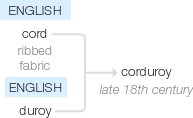Corduroy
late 18th century: probably from cord ‘ribbed fabric’ + duroy, denoting a kind of lightweight worsted formerly made in the West of England, of unknown origin.
wiktionary
Origin uncertain. Probably from cord + duroy(“name of a 17th century coarse fabric made in England”). Probably not from French *corde du roi(“cloth of the king”), which is unattested in French, where the term for the "cloth of the king" was velours côtelé. Possibly from cordesoy(“corde de soie”), or "rope of silk or silk-like fabric" in French), named for example in a 1756 advertisement for clothing fabrics; see Wikipedia article, and comparable in language form to the contemporary serg(e)dusoys(“silk serge”), see Serge (fabric).
etymonline
corduroy (n.)
"thick, cotton stuff with a corded or ridged surface," 1774, probably from cord + obsolete 17c. duroy, name of a coarse fabric made in England, which is of unknown origin. Folk etymology is from *corde du roi "the king's cord," but this is not attested in French, where the term for the cloth was velours à côtes. As an adjective from 1789. Applied in U.S. to a road of logs across swampy ground (1780s) on similarity of appearance.
CORDUROY ROAD. A road or causeway constructed with logs laid together over swamps or marshy places. When properly finished earth is thrown between them by which the road is made smooth; but in newly settled parts of the United States they are often left uncovered, and hence are extremely rough and bad to pass over with a carriage. Sometimes they extend many miles. They derive their name from their resemblance to a species of ribbed velvet, called corduroy. [Bartlett]
